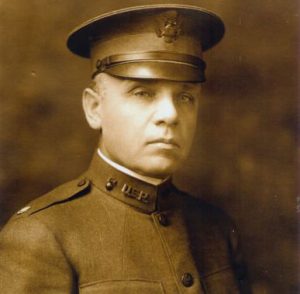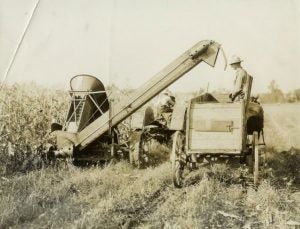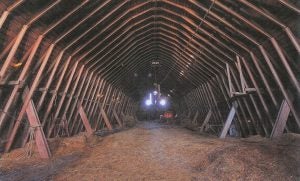If only Col. Emil Tyden had invented a machine for time travel too, the Swedish teenager who immigrated to America in the 1880s would see the perpetual harvests his life still yields.
Judy Pitzenberger — who along with her husband, Ted, and their sons, owns and lives on Tyden Farm No. 6 today — remarked at how innovative the farm’s founder was in all respects, and how he would undoubtedly be fascinated by the advances made in agricultural technology.
“I think he would get a kick out of it,” she said in mid-November after another successful harvest. Today, the farm Tyden purchased a century ago hosts regular historic tours and boasts not only documentaries made of its founder, but a book in the works. Judy remarked that the author of that coming book and she are continually surprised by its subject. “The joke between the author and myself is we can’t find any dirt on the man,” she laughed.

An American story
Born in Sweden about 1865, Tyden immigrated to the U.S. at the age of 17 with just $20 to his name. Landing in Moline, Illinois, his first job was with the Moline Organ Company, which, while long since closed, produced a pipe organ still operational in Davenport, Iowa, that many believe was worked on by the young teen himself.
In just a matter of years, Tyden had launched a number of different enterprises around his mechanical ability, and among those was a cement company that provided concrete for the 1893 World’s Fair in Chicago. But it was his job as a land agent for the Union Pacific Railroad that proved most valuable, as it was there that he noticed the inefficiency of sealing boxcars and subsequently patented the Tyden Self-Locking Seal, a tamper-proof device that fit any boxcar locking mechanism. Patent in hand, he moved to Hastings, Michigan, and founded Tyden’s International Seal and Lock Co. to mass produce the product, a full decade before Henry Ford developed his own assembly line for automobiles.
A fire at the plant in 1920 got him interested in sprinkler systems, which in turn gave birth to the Viking Corp., which continues to produce sprinkler systems and valves globally today. Those abilities were put to his new nation’s service during World War I when, in 1914, President Woodrow Wilson commissioned Tyden a lieutenant colonel and appointed him director at the Rock Island Military Arsenal in Illinois, the largest government-owned arsenal in the U.S.
The creative spark of the innovator never left Tyden, who continued to invent throughout his life before passing away in 1951 at the age of 86 with more than 200 patents.

Investments paid forward
Around the time of his work for the military, Tyden began investing in farm ground in North Central Iowa. Between 1915 and 1938, he acquired eight farms in the Floyd and Butler counties region there, totaling about 3,000 acres. Tyden was able to continue farming throughout the Great Depression, and as Judy explained, it was in this capacity that the soul of the once-young immigrant really shined through and lives on in the memories of neighbors. By this point, a true officer and gentleman of means, he clearly never forgot his roots.
“Ted was told the story about Emil that in 1934 a farm came up for sale that was connected to land he already owned. He and another man were bidding on the farm, and Emil approached the other man and asked him if he had a reason to buy that farm. The other man told him he had two sons and one farm, so he was buying it for his other son. Emil told him he wasn’t going to bid any more. Dennis McWilliams the man’s grandson is the one that told Ted. Dennis’ daughter and son-in-law farm that farm today,” she recounted in one of many statements being recorded of Tyden’s legacy throughout the area.
Blending his organizational genius into a penchant for humanitarianism, Tyden organized his farms in such a manner as to maximize employment throughout the Great Depression. For each of his farms, Tyden hired a manager and hands to operate it while he remained in Michigan. Judy explained that each manager was provided a house, a milking cow, and hundreds of chickens, and the farms included full-time work crews for painting, cement, and labor, which amounted to hundreds of jobs at a time when food and money was scarce.
And, his creative spirit remained bright throughout this period as well, as Tyden modernized the farm in a progressive manner, studying new techniques at Iowa State College and inventing a protein mix for cattle. That mix led to the opening of Tyden Livestock and Feeding Co. in Dougherty, Iowa, and while the mix itself went on to be sold nationwide, its inventor allowed local farmers the opportunity to buy at discount along with other supplies there.
“On the opening day of the feed store, he and some other young lads were talking about ‘mud slides.’ They were vanilla ice cream with chocolate syrup in a sundae glass. Col. Tyden asked what they were, and after they told him, he told the other gentlemen at the opening that he would be back shortly, but was headed to the drug store to share ‘mud slides’ with these young lads,” Judy said, noting that story was re-told her by the nephew of George Cook, then-manager of the Tyden Feed Store.

Tradition continued
Ted’s aunt and uncle lived just up the road from the Tyden farms, and he’d ridden by numerous times a child while growing up on his own family’s farm. Ted and Judy met while students at North Iowa Community College, and after marrying in 1969, started their lives together on Tyden Farm No. 3 in the rented house there, renting their first farm in 1971. Growing their farming business along with their own family over the next 20 years, in 1994 they purchased the 10-acre farmstead of Tyden Farm No. 6.
Judy said the family maintains the commitment to progressive farming envisioned by Tyden and continues to experiment with different techniques and methods. Meanwhile, Tyden Farm No. 6 today has evolved into a full-blown ag-tourism center, featuring with a family farm museum and tours available complete with antique farm equipment, gardens, and the home itself. Cultural visits have been made by farmers from Ukraine and Argentina, and the family continues to expand its base of knowledge with all things modern and innovative, just as an old immigrant from Sweden would have wanted it.
If only he’d have invented a time machine, too.



